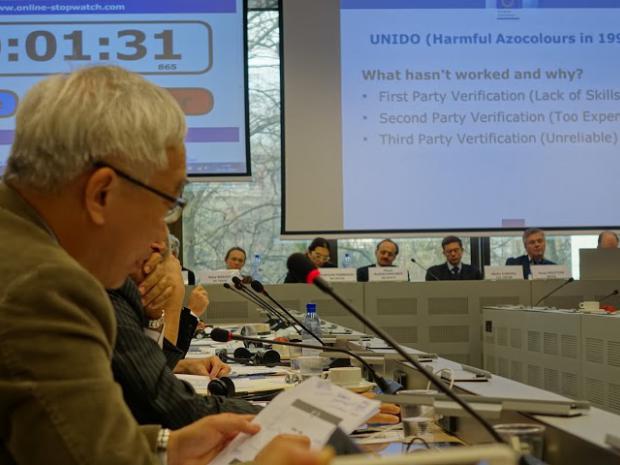UNIDO’s contribution to the EU stakeholder forum on sustainable garment
Discussion details
UNIDO contributed to an informal multi-stakeholder forum on responsible management of the supply chain in the garment sector organized by the European Commission.
UNIDO contributed to the meeting with a presentation on success factors and weaknesses in the case of Harmful Aze colours in Hong Kong 1994 by Yuen-Hoi Lee, Industrial Development Officer. Moreover, Florian Peter Iwinjak, Programme and Liaison Officer co-chaired one of three brainstorming sessions on expectations and potential actions and presented the outcomes to the plenary.
According to the European Commission, responsible supply chains touch upon several aspects of sustainable development ranging from safety at work, the use of chemicals, child labour, to 'living wages' and collective rights, including enforcement of appropriate national legislation and of international standards and commitments as well as many others issues more directly linked to the sustainable competitiveness of the EU companies involved in such supply chains.
In preparation for a potential flagship initiative, the EU therefore organized this informal meeting with stakeholders on responsible management of the supply chain in the garment sector aiming at:
- Increasing awareness to foster responsible management of the supply chain in the garment sector, and enhancing the understanding of the European consumers,
- Improving communication on relevant EU actions on strengthening sustainable development in partner countries and in the global supply chain.
- Launching an inclusive and participatory consultation process gathering all stakeholders,
- Encouraging better coordination between all relevant actors already active in this area
Together with the EU, UNIDO has been implementing projects in the textiles sector such as the Better Work in Garments and Textiles (BWGT) as part of the Better Work and Standards (BEST) project in Bangladesh or others under SWITCH Asia on leather in the “Re-tie” project in Bangladesh and on CSR in Vietnam. These projects achieved better compliance with international social, environmental, quality and CSR standards while increasing Occupational Health and Safety (OHS) as well as the competitiveness of local SMEs and producers.
As a specialized agency of the United Nations, UNIDO has a large standing expertise in the area of sustainable supply chain development in the garment/textile as well as leather sector. In the leather sector UNIDO has established the “Leather Panel”, a global forum for technical assistance programmes dealing with the leather-based industry sector.
For more info on EU-UNIDO’s Better Work in Garments and Textiles, see http://bwtg.org/
For more info on UNIDO in textiles, see link
For more info on UNIDO in leather, see link and http://leatherpanel.org/
For more info on UNIDO in supplier development, see link
For more info on UNIDO in SWITCH Asia, http://www.switch-asia.eu/projects/re-tie-bangladesh/ and http://www.switch-asia.eu/projects/crs-vietnam/

Florian Peter Iwinjak presenting suggestions for potential actions from the brainstorming session.

Yuen-Hoi Lee underlining success factors and weaknesses in the case of Harmful Aze colours in Hong Kong 1994.
Log in with your EU Login account to post or comment on the platform.